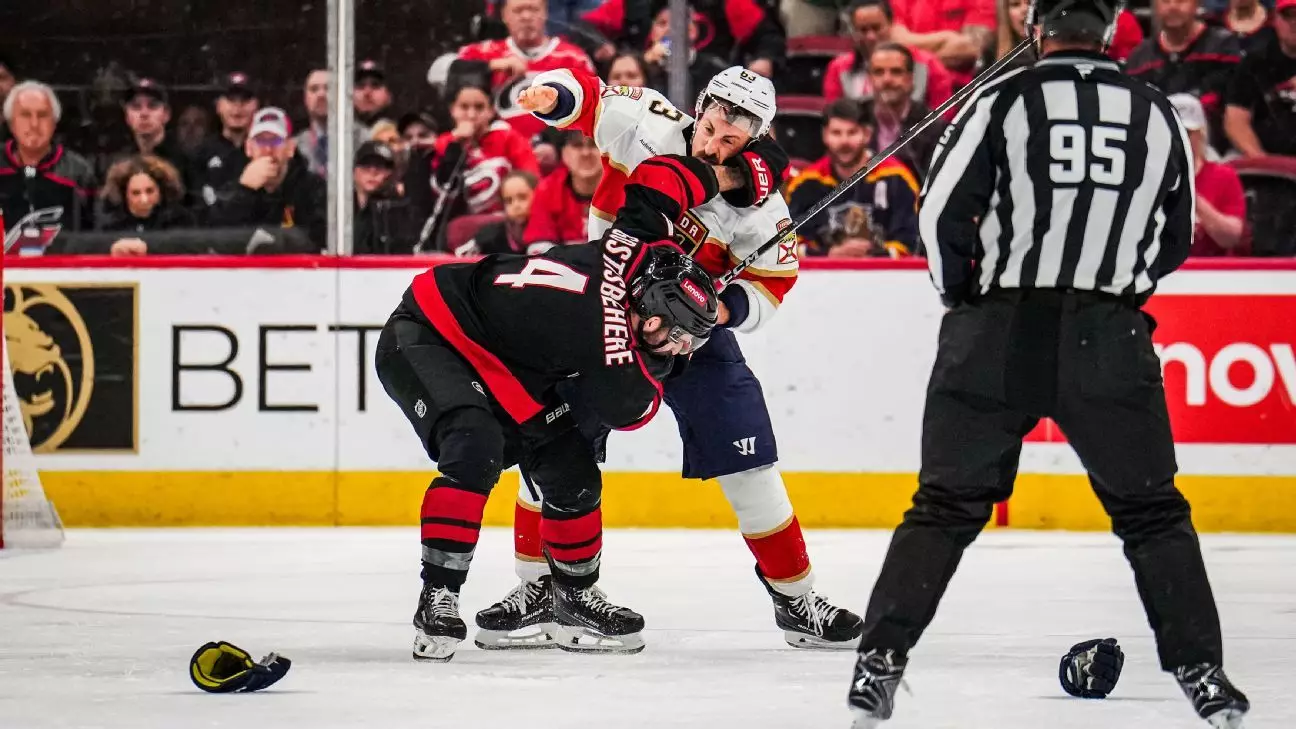The Carolina Hurricanes find themselves at a critical juncture in the Eastern Conference finals, as they adjust their strategies after a somewhat disheartening Game 1 against the Florida Panthers. Coach Rod Brind’Amour’s sentiments resonate deeply within the locker room, calling for a refined approach to handle the persistent provocations from the Panthers, known for their relentless physicality and mental games. His message was clear: it is vital for the Hurricanes to remain composed, strategically sidestepping the pitfalls of retaliation that only serve to undermine their game plan.
In any competitive sport, understanding an opponent’s style is paramount. The Panthers epitomize this aggressive mindset, an approach they have honed into a fine art, allowing them to capitalize on opponents’ mental lapses. For the Hurricanes, the challenge is not merely to retaliate but to outsmart a team that thrives on chaos. As Brind’Amour noted, it’s about sticking to what will lead to victory, which centers on maintaining discipline on the ice, an area that faltered in Game 1.
Consequences of Retaliation: A Case Study
An illustrative moment in Game 1 was the penalty issued to Hurricanes center Sebastian Aho. His decision to retaliate against Anton Lundell after a rough exchange resulted in a penalty that proved detrimental to his team. It’s a classic example of how a single moment of fury can alter the momentum of a game and possibly sway the entire series. The mathematics are stark: Carolina is 5-0 when they strike first but mere frustration led to a penalty that allowed Florida to take control.
The referees’ failure to call Lundell’s initial provocation highlights a recurring issue in competitive hockey: the sometimes minute distinction between provocation and retaliation. Aho’s frustration was understandable, but in the playoffs, where every single call can impact the outcome, it’s essential for players to keep their cool. Brind’Amour’s emphasis on the need for composure under pressure is not merely posturing; it’s essential for postseason success. Every penalty taken against the Hurricanes is a lost opportunity on the power play, and against a skilled team like the Panthers, that can prove catastrophic.
Learning from Mistakes: The Role of Self-Regulation
The Hurricanes must embrace a lesson in self-regulation, which extends beyond refraining from retaliatory actions. It involves recognizing the elements that chip away at their discipline and how to circle back towards a strategy that fosters success. The tendency to react emotionally can fracture their performance, allowing opponents like Florida to thrive on any psychological advantage they can muster.
During the game, it was not only Aho’s response that was telling. Defenseman Shayne Gostisbehere’s reaction in the third period by shooting a puck at Brad Marchand—though less severe—illustrates this ongoing battle of emotions. While Gostisbehere’s actions momentarily sparked a shift in penalties and dynamics, it underscores the broader challenge the Hurricanes face in maintaining focus and not crumbling under frustration.
Coach Brind’Amour encourages a culture of growth where every player recognizes their role in curbing emotional responses. The need for mental fortitude is undoubtedly magnified during playoff hockey. Every player, from the netminder to the forwards, must develop a mental resilience that allows them to absorb physical scrambles without resorting to needless penalties.
Florida Panthers: A Study in Composure
On the flip side, the Panthers have adopted a contrasting philosophy that pays off. Their ability to manage the mental aspects of the game provides them with an advantage. Goaltender Sergei Bobrovsky’s indifference to physical confrontations and aggressive strategies from opponents shows a level of maturity that many in younger teams struggle to attain.
For Florida, knowing when to deliver a heavy hit and when to take a step back is integral. This balance allows them to engage aggressively while simultaneously managing the emotional aspect of the game. Coach Paul Maurice aptly recognizes that Bobrovsky’s composed demeanor is not just a personal attribute but a strategic asset, reinforcing the importance of emotional regulation in the midst of chaos.
As the series progresses into Game 2, the Hurricanes need to draw lessons from the Panthers’ example, realizing that success hinges on more than physical prowess; it lies in the ability to navigate the psychological minefield presented during intense playoff series. Each skirmish on the ice is a test of character and resolve—a reality that, if embraced, may very well unlock the key to Carolina’s resurgence in these high-stakes confrontations.


Leave a Reply